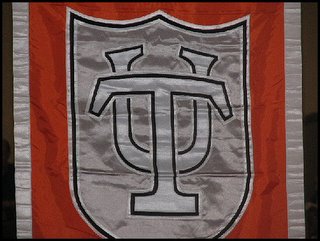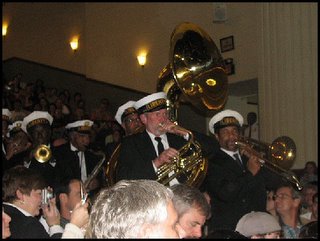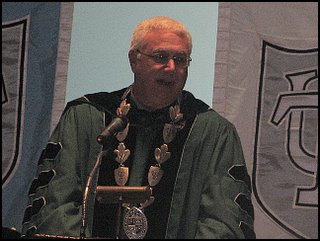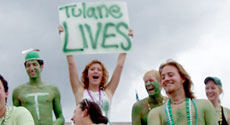For the last ten months or so, I've been doing a retreat based on the Spiritual Exercises of St. Ignatius. Ignatius, who worked out the concepts and practices that eventually emerged as the Exercises over a lengthy period of convalesence from a disastrous battle injury, initially thought of them as the foundation for a thirty-day retreat. However, recognizing that there would be people interested in doing the Exercises who would be unable to absent themselves from their usual responsibilities for thirty consecutive days, he noted that it would also be possible to work though them on a daily basis, with periodic meetings with a spiritual director, over a much lengthier period of time. Hence, the "19th Annotation" retreat, so named because he mentions it in the 19th Annotation to the Exercises.
As my own retreat neared its conclusion last month, I became obsessed with early Jesuit history and so, at the same time that I was reading about Celtic Christianity in western Europe in preparation for the trip to Iona, I was also soaking up information about the Jesuits and their beginnings 1000 years later. And while I had initially planned a trip to Paris in large part for the purpose of getting to Chartres, the Jesuits found their way into my objectives, too.
Although he was born in the northern Basque area of Spain and obtained his early education there, Ignatius eventually made his way to the University of Paris, where he met the men who would become his earliest companions and the founding members of the Company of Jesus. (Fascinating to at least this Presbyterian is that Ignatius was a contemporary of the early Protestant reformers, and that he and John Calvin attended the University of Paris at the same time.)
My quest evenutally focused in on Montmartre and on the tiny church at the foot of Sacre'-Coeur known as the Chapel of the Martyrs. Sacre'-Couer is a famous landmark in Paris if for no reason other than its singular appearance on a hillside to the north of the city. Tourists who know nothing about it from a religious or historical standpoint still recognize it when they see it from the towers of Notre Dame or the top floor of the Centre Pompidou from its image on hundreds of postcards and guidebooks.
Almsot no one has heard of the Chapel of the Martyrs, and probably very few people stumble across it, located as it is on a side street slightly out of the way of the usual Montmartre walking routes. I was at something of a loss myself, until at the very last minute I stumbled across an article giving the address and indicating that it might be open on Friday afternoons.
"Okay," I announced, our first full day in Paris being also our only Friday there, "we are off on a quest for the first Jesuits," seven men who met in the Chapel of the Martyrs and made their first vows among themselves on August 15, 1534. The chapel itself was, like many of the sacred buildings in France, destroyed during the French Revolution and rebuilt during the next century.
We found it nestled on a busy side street, almost hidden behind scaffolding, but with a sign indicating that it would open at 3:00. Having arrived early in the afternoon, we went on up to wander around Sacre'-Coeur and Montmartre. Photography is not permitted inside basilicia, and it was barely light enough even to see the mosaics lining the side chapel walls, including one extensively illustrated by portions of the Jesuit story and another featuring St. Angela Merici (of interest to me since I went to an Ursuline school for a time). (Look for photos of Monmartre in another entry.)
As the afternoon waned, we found our way back down the hill to the Chapel of the Martyrs, nestled partway underground at the end of a short corridor. The chapel itself is maintained with the simplest of decors -- whitewashed walls, clear windows, a plain altar, and a large oil painting on the wall of the Jesuits making their vows at that spot. I won't try to convey what it meant to me to sit there quietly for an hour, to pray and absorb the powerful event that had taken place there but, after nearly a year in the company of Ignatius, it was one of the most moving experiences of my life. In another week I would be en route to Iona, frequently mentioned as one of the earth's thin places, where the seen and unseen worlds seem almost to meet, but I had already found a thin place under the bustle of Montmartre.
As my own retreat neared its conclusion last month, I became obsessed with early Jesuit history and so, at the same time that I was reading about Celtic Christianity in western Europe in preparation for the trip to Iona, I was also soaking up information about the Jesuits and their beginnings 1000 years later. And while I had initially planned a trip to Paris in large part for the purpose of getting to Chartres, the Jesuits found their way into my objectives, too.
Although he was born in the northern Basque area of Spain and obtained his early education there, Ignatius eventually made his way to the University of Paris, where he met the men who would become his earliest companions and the founding members of the Company of Jesus. (Fascinating to at least this Presbyterian is that Ignatius was a contemporary of the early Protestant reformers, and that he and John Calvin attended the University of Paris at the same time.)
My quest evenutally focused in on Montmartre and on the tiny church at the foot of Sacre'-Coeur known as the Chapel of the Martyrs. Sacre'-Couer is a famous landmark in Paris if for no reason other than its singular appearance on a hillside to the north of the city. Tourists who know nothing about it from a religious or historical standpoint still recognize it when they see it from the towers of Notre Dame or the top floor of the Centre Pompidou from its image on hundreds of postcards and guidebooks.
Almsot no one has heard of the Chapel of the Martyrs, and probably very few people stumble across it, located as it is on a side street slightly out of the way of the usual Montmartre walking routes. I was at something of a loss myself, until at the very last minute I stumbled across an article giving the address and indicating that it might be open on Friday afternoons.
"Okay," I announced, our first full day in Paris being also our only Friday there, "we are off on a quest for the first Jesuits," seven men who met in the Chapel of the Martyrs and made their first vows among themselves on August 15, 1534. The chapel itself was, like many of the sacred buildings in France, destroyed during the French Revolution and rebuilt during the next century.
We found it nestled on a busy side street, almost hidden behind scaffolding, but with a sign indicating that it would open at 3:00. Having arrived early in the afternoon, we went on up to wander around Sacre'-Coeur and Montmartre. Photography is not permitted inside basilicia, and it was barely light enough even to see the mosaics lining the side chapel walls, including one extensively illustrated by portions of the Jesuit story and another featuring St. Angela Merici (of interest to me since I went to an Ursuline school for a time). (Look for photos of Monmartre in another entry.)
As the afternoon waned, we found our way back down the hill to the Chapel of the Martyrs, nestled partway underground at the end of a short corridor. The chapel itself is maintained with the simplest of decors -- whitewashed walls, clear windows, a plain altar, and a large oil painting on the wall of the Jesuits making their vows at that spot. I won't try to convey what it meant to me to sit there quietly for an hour, to pray and absorb the powerful event that had taken place there but, after nearly a year in the company of Ignatius, it was one of the most moving experiences of my life. In another week I would be en route to Iona, frequently mentioned as one of the earth's thin places, where the seen and unseen worlds seem almost to meet, but I had already found a thin place under the bustle of Montmartre.





